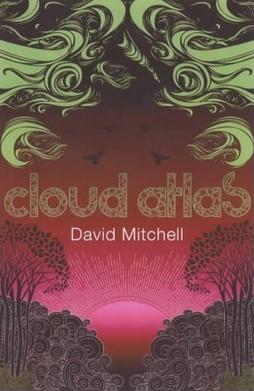
You feel thrown into the life of a maritime traveller in the 19th century by reading excerpts from his journal. The first-person perspective mixed with the antiquated, informal and peculiar language knocks you off-balance. It’s not entirely clear what the narrator wants you to imagine or see from his perspective, and you almost feel blind-folded, curious about his goals and where the story is heading. Although it’s a little confusing at first, be assured, it’s leading you to an incredible story.
Design
This feeling of uncertainty will later seem intentional, as each chapter of the book is aimed to convey a seemingly independent part of a character’s life. However, these apparently independent stories will be woven into a complex narrative, where each story is actually a record—whether written in journals, letters or video-recorded—and read or viewed from the perspective of another character within the book.
It starts off time-linearly, starting in the 19th century and ending in an apocalyptic future. Each chapter is set in a separate location—the southwest Pacific Ocean, Belgium, California, Great Britain, Korea and Hawaii—and separated by approximately one person’s lifetime in each story. The time linear sequence ends abruptly in the middle of the book, where the order is reversed and we descend from the apocalyptic future in Korea back to the Pacific Ocean in the 19th century. Each story that had ended with a cliff-hanger in the first half of the book is subsequently completed in reverse order.
This mirror feels fresh and innovative and allows you, as the reader, to make sense of the complex weave of stories, and understand the book as a whole. You can really feel that the bulk of the novel’s creativity was dedicated to this structure, where each story and character were carefully crafted to make it a truly innovate piece of literature. It feels natural, and simply contributes to the entertainment value of the book.
Thoughts
It seems that the book is attempting to convey the predatory nature of humans. The main character of each chapter is preyed upon by other individuals, groups, families, tribes or large institutions. You come to understand that if an individual is preyed upon, he or she can resist—and should resist—as small acts of resistance can culminate into real oppositions against tyrannical and predatory organizations. Yet, although these acts of resistance can be fulfilling for an individual and influential for the prey as a whole, human nature is as-it-is, no matter the place or time in history, this negative side to our nature will prevail. There is an eventuality and cyclicality to our predatory nature, exemplified by the apocalyptic future in the novel.
Writing
Each story uses a different prose to convey the time period in which each character lives. The difference in language used by each character is a work of art in itself, and really adds towards the differentiation and evolution between each story. Traces of the environment bleed into their first-person narrative. For example, the fifth story is based in a dystopian coporatocracy and the characters commonly use a large company’s name for an object (the main character refers to movies as old disneys).
I was afraid that due to the first-person narrative structure of the novel, David Mitchell’s beautifully descriptive writing wouldn’t be able to shine through. Although it’s not as predominant as in some of his works—such as The Thousand Autumns of Jacob de Zoet—, he is still able to show off his masterful control of prose within each story. Although it is better appreciated when it’s subtly slid into the background of the story, I saved a few excerpts:
Building anticipation and tension before action…
“She takes the stairs down to the empty lobby. The carpet is silent as snow. A radio whispers sweet nothings in the back office.”
Offhandedly the debasing of a character’s morales…
“An amputated sycamore tree shed once green foliage like desperate men shed once steadfast resolutions.”
Even forced within the constraints of a future apocalyptic broken English dialect…
“Souls cross ages like clouds cross skies, an’ tho’ a cloud’s shape nor hue nor size don’t stay the same, it’s still a cloud an’ so is a soul.”
His mastery of poetic language fits seamlessly throughout his stories. From my experience as a reader, this is a trait that can be developed and worked on for writers, but there are very few that can really master it like David Mitchell.
Final Review
Cloud Atlas is very well written book, with an incredible story-line spanning across different characters and time periods. David Mitchell did spectacular work in making the independent stories come together into a novel with a concise theme and a very good entertainment value. I personally found it to be not as good when compared to some of his other works, such as number9dream, The Thousand Autumns of Jacob de Zoet or Bone Clocks, but this may have been due to it’s hype in indie-culture, especially with a movie based on the book written and directed by the Wachowskis. Although it shouldn’t soar to the top of your reading list, it is an excellent book and well worth reading.